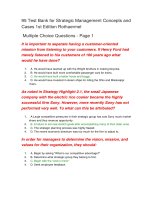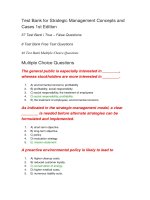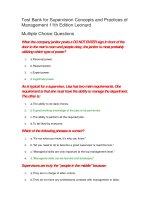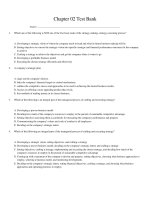Test bank business ethics concepts and cases chapter 61
Bạn đang xem bản rút gọn của tài liệu. Xem và tải ngay bản đầy đủ của tài liệu tại đây (80.59 KB, 4 trang )
1.
What is the market approach to consumer protection? In what ways does it fall short of
completely protecting consumers?
2.
In the Market Approach to consumer protection, if consumers do not place a high value on
safety (or are unwilling to pay for it), then it is wrong to force them to accept higher levels
of safety through regulation.
a.
True
b.
False
3.
Critics to the market approach respond that the benefits of free markets are obtained only
when the markets have all of the seven defining characteristics. Several of these are:
a.
There are numerous buyers and sellers.
b.
Everyone can freely enter and exit the market.
c.
The market is unregulated.
d.
All the above
e.
A&B
4.
Why are people not good at making probability estimates? How is this relevant to
consumer protection issues?
5.
According to the contract view of businesses' duties to customers, what are the four
basic duties a firm has to its customers? Why are they necessary? What objections do
critics raise about this theory?
6.
The consumers who think ahead, consider, and watch every penny they spend, knowing
how their choices will affect their preferences are known as:
a.
Irrational utility minimizers.
b.
Rational utility maximizers.
c.
Rational consumption maximizers.
d.
All the above
7.
Research has shown people are irrational and inconsistent when weighing choices based
on probability estimates of future costs and payoffs.
a.
True
b.
False
8.
What characterizes the due care theory? To what aspects of business does a producer's
duty to exercise due care extend?
9.
How does the social costs view extend the due care theory and the contract view? Why do
its critics say that the social costs view is unfair? Are their arguments persuasive?
10.
The ________ theory of businesses' duties to consumers claims that a business has four
main moral duties: the basic duty of (a) complying with the terms of the sales contract,
and the secondary duties of (b) disclosing the nature of the product, (c) avoiding
misrepresentation, and (d) avoiding the use of duress and undue influence.
a.
Contractual
b.
Commercial
c.
Competitive
d.
Consumptive
11.
The due care theory of the manufacturer's duties to consumers is based on the idea that
consumers and sellers do not meet as equals and that the consumer's interests are
particularly vulnerable to being harmed by the manufacturer, who has a knowledge and an
expertise that the consumer lacks.
a.
True
b.
False
12.
What are the social effects of advertising? Does it really create consumer desire in the
way that Galbraith maintained?
13.
How does advertising become unethical? What steps must each part of the advertising "
communication" process take to ensure that it remains ethical?
14.
The most common criticism of advertising concerns its effect on the consumer's beliefs.
a.
True
b.
False
15.
Although there are some advertisements that are intended to manipulate, such
advertisements do not violate the consumer's right to be treated as a free and equal
rational being.
a.
True
b.
False
16.
What factors must be taken into consideration when determining the ethical status of a
particular advertisement?
17.
Why do consumers have a right to privacy? Why does industry have a right to know
consumers' personal information? How do we strike the balance between them? What
considerations are relevant when striking this balance?
18.
__________is privacy with respect to a person's inner life. This includes the person's
thoughts and plans, personal beliefs and values, feelings, and wants.
a.
Physical privacy
b.
Personal privacy
c.
Psychological privacy
d.
Spiritual privacy
19.
Credit Solutions initially advised their clients not to pay their credit cards.
a.
True
b.
False
20.
Credit Solutions has been sued by the attorney general of five states.
a.
True
b.
False
21.
Even though advertizing issues are complex, they must include:
a.
Social effects
b.
Effects on desire
c.
Effects on belief
d.
B&C
e.
All of the above
22.
A study by consumer reports found errors in 43 percent of the credit reports that they
analyzed.
a.
True
b.
False
23.
Which are the three main credit reporting companies?
a.
Experian, Credex, and Your Credit
b.
Experian, Real Credit, and Credibility
c.
Experian, Equifax and Trans Union LLC
d.
Experian, Exact and Specialty
24.
In a narrow sense, the right to privacy can be defined as the right of persons to determine
what, to whom, and how much information about themselves will be disclosed to other
parties.
a.
True
b.
False
Test Name: chapter 6
1.
2.
3.
4.
5.
6.
7.
8.
9.
10.
11.
12.
13.
14.
15.
16.
17.
18.
19.
20.
21.
22.
23.
24.
a.True
d.All the above
b.Rational utility maximizers.
a.True
a.Contractual
a.True
a.True
b.False
c.Psychological privacy
a.True
b.False
e.All of the above
a.True
c.Experian, Equifax and Trans Union LLC
a.True









